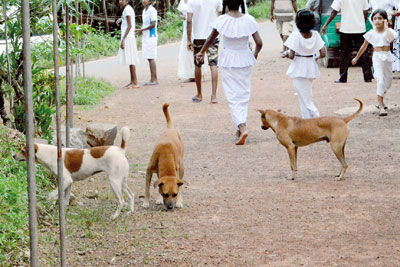News
Infected dog trips up rabies-free campaign
Sri Lanka will not be able to declare it is a rabies free country by 2020 because a stray dog has tested positive this year.

So far this year, there has been one case of a dog infected with rabies.
A country needs to be free from reports of dogs infected with the deadly virus for three consecutive years to claim it is rabies free, according to the World Health Organization.
The Medical Research Institute in Colombo has reported that the head of a stray dog tested positive, the Colombo Municipal Council’s veterinary department said last week.
With WHO assistance, Sri Lanka has been working towards eradicating rabies in dogs.
In 2015, there were only five cases of dogs infected with rabies. But, last year, there were 25 cases. This year, there has been one case, so far.
Chief veterinary surgeon, Dr. Vipula Dharmawardena, said: “Now we have only one chance in the next three years ([2018, 2019 and 2020).”
In 1971, human rabies was declared a notifiable disease, following which, in 1975, a countrywide comprehensive rabies-control programme was launched to reduce rabies.
The Ministry of Health has taken it up as a national health priority. Under a national strategy to eliminate infections in dogs, more than 300 medical officers of health have been directed to scale up dog vaccination, strengthen surveillance for infected dogs and humans, and promote responsible dog ownership.
Health officers will visit homes, register dogs, and provide rabies vaccinations free.
Still, the department is short-staffed with vacancies for 20 people, Dr. Dharmawardena said.
“After 25 years, 12 people including two dog-catchers were recruited. I hope the other vacancies will also be filled,” he said.
He noted that educational attaintments have been set high for dog-catchers, making recruitment a challenge. “They need six subjects with two credits at the Ordinary Level examination to catch dogs,” he said.

